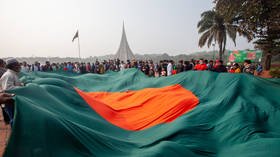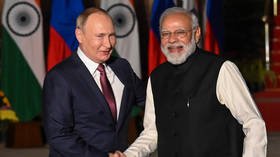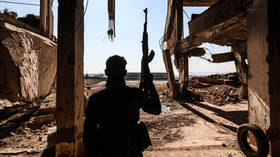This war redrew South Asia’s map, and the reverberations are still being felt 50 years on

On December 16, Bangladesh celebrates its 50th Victory Day to mark half a century since its freedom fighters fought valiantly with India’s support to defeat Pakistan’s military and establish a new sovereign country.
The golden jubilee of that epic liberation war, which hived off what was known as East Pakistan from West Pakistan, is being commemorated as a historic milestone by Bangladeshis and Indians with nostalgic and emotional tributes to martyrs.
A geopolitical swing state
Like the 1967 Arab-Israeli war that remade the political geography of the Middle East and gave Israel the upper hand, the 1971 Bangladesh war redrew the map of South Asia and tilted its balance of power in favour of India.
The presence of the president of India, Ram Nath Kovind, as the guest of honour at the 50th Victory Day parade in Dhaka, and the earlier visit of Indian Prime Minister Narendra Modi as chief guest at Bangladesh’s 50th Independence Day in March 2021, are signals that the ‘spirit of 1971’ – wherein India offered sanctuary to Bangladeshi guerrillas and refugees, and the Indian military entered into direct combat with Pakistani forces to force a surrender – is being sought to be consciously nurtured.
New Delhi’s assertions that Bangladesh-India ties are “deeper than any strategic partnership,” and that they constitute a “role model for relations between two neighbouring countries,” show how central Dhaka is to Modi’s ‘neighbourhood first’ foreign policy of sustaining Indian influence through mutually beneficial links with smaller countries in South Asia.
History has taught India not to take Bangladesh for granted. After the 1971 liberation war, India hoped to consolidate the independence of the newly formed republic, steer it in a moderate direction, and prevent it from falling back into Pakistan’s ideological orbit. But a shocking military coup d’etat in 1975, in which the pro-India founder of Bangladesh Sheikh Mujibur Rahman was assassinated, was a monumental setback. Under military rulers from 1975 to 1990, Bangladesh’s policies prioritised Islamist fundamentalism and drew closer to Pakistan.
Even after the advent of electoral democracy, the Bangladesh Nationalist Party (BNP) and its ally, the Jamaat-e-Islami, stood for a vision of the country that emphasised its religious Islamic identity and distanced it from Hindu-majority India. Under their watch, the rise of fundamentalist jihadist terrorist outfits like Harkat-ul-Jihad-al-Islami (HUJI), which targeted Bangladesh’s Hindu minorities and carried out attacks across the border in India, was alleged to have links with Pakistan’s intelligence agencies, which were believed to be eager to avenge, if not reverse, the defeat of 1971.
India felt safer and assured only when the secular and moderate Awami League (AL) party, led by the current Prime Minister Sheikh Hasina (daughter of the slain Sheikh Mujibur Rahman), won elections and held on to power. The question of who rules Bangladesh is, of course, a choice for the Bangladeshi people to make. But for a long time, it was also seen as a pendulum swing between pro-India and pro-Pakistan political forces inside Bangladesh.
Since 2009, however, with Hasina firmly in the saddle and the BNP considerably weakened, it has been a triumphant march for India with little opportunity for Pakistan to play the Islamic fraternity card. The very creation of Pakistan in 1947 as a separate nation for the Muslims of the subcontinent was negated by the 1971 Bangladesh liberation war, when Bengali-speaking Muslims rejected the idea that Islam was enough to keep them satisfied in a Punjabi-dominated Pakistan.
Bengali Muslims made common cause with Hindu Bengalis next door in India to break free from Muslim Pakistan in the 1971 war, showing that culture and nationalism are sophisticated concepts which cannot be reduced to religion alone.
Hasina’s insistence that “we will not allow anyone to create any anarchy or division in this country in the name of religion,” and her appeal to Bangladeshis not to “trample the Liberation War’s spirit of non-communalism” are attempts to keep her country firmly on the inclusive and cohesive social path envisioned by her late father.
Being Bangladeshi today
The issue of who holds power in Bangladesh is not only a matter of India-Pakistan rivalry but a question of Bangladesh’s core national self-image. The debate is whether or not Bangladesh has exorcised the ghosts of the 1971 war, which caused the deaths of up to three million people and included a horrific genocide against Bengali-speaking East Pakistani civilians by the Punjabi-dominated West Pakistani military.
Hasina’s proactive judicial steps over the years to punish the perpetrators of the 1971 genocide and her defence of the secularism principle in Bangladesh’s constitution have tried to set to rest, once and for all, what Bangladesh’s essence ought to be.
Still, frequent attacks on religious minorities in Bangladesh by jihadist non-state actors and the worrisome resurgence of Al-Qaeda and Islamic State-inspired violence there have kept old wounds festering. While there is a strong civil society in Bangladesh which mobilises against radical Islamists and their hate-filled activities, elements who never accepted the creation of Bangladesh and who sided with Pakistan during the 1971 war are active and continue to foment social divisions in the name of an exclusive and puritan Islamic identity.
Despite the wrenching challenges of national unity, religious intolerance and authoritarian governance, it is indisputable that Bangladesh has leapt forward in economic growth and modernisation under Hasina. In 2020, Bangladesh’s per capita income even overtook that of India and left Pakistan far behind. Its success in lifting tens of millions of citizens out of poverty through a focused strategy of industrialisation and exports is commendable and has ensured that it can deal with the outside world with a sense of self-confidence.
The skill with which Hasina has advanced the umbilical relationship with India, courted foreign investment from India’s strategic adversary China, and yet maintained enough of a balance in relations with Japan and Western countries so as not to become dependent on China has been possible on the back of Bangladesh’s roaring economic miracle and her assured long tenure in power.
Fifty years after Bangladesh came into being in a blood-soaked war, its ability to make independent choices and to grow economically is no longer in doubt. By virtue of its large market and geostrategic location, Bangladesh is being courted by both India and China. Pakistan, which never overcame the trauma of losing its entire eastern portion in the 1971 war, has receded from the picture but will be hoping that it can stage a comeback and regain a foothold if and when Hasina loses power.
Whatever happens to Bangladesh’s basic orientation is also crucial for the Islamic world. Bangladesh being the third-largest Muslim-majority country in the world with a population of nearly 170 million, Hasina’s formulation that her people are “religious, not fanatics” will be keenly observed as an indicator of the future of Islam.
The victory of the 1971 war is never guaranteed and will have to be preserved by generation after generation of Bangladeshis who are conscious of the internal and international forces wanting to mould their destiny. But at 50, they can congratulate themselves for having lasted longer as a secure nation than Pakistan, which broke up after just 24 years of independence in the fateful war of 1971.
The statements, views and opinions expressed in this column are solely those of the author and do not necessarily represent those of RT.















